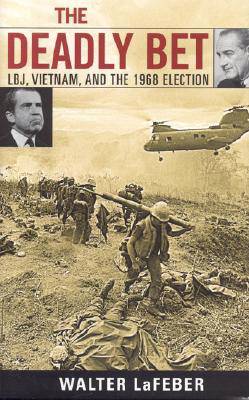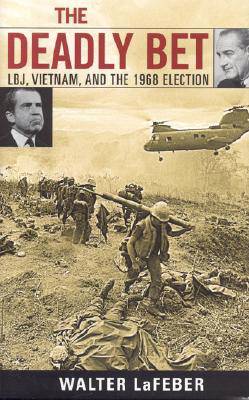
- Afhalen na 1 uur in een winkel met voorraad
- Gratis thuislevering in België vanaf € 30
- Ruim aanbod met 7 miljoen producten
- Afhalen na 1 uur in een winkel met voorraad
- Gratis thuislevering in België vanaf € 30
- Ruim aanbod met 7 miljoen producten
Zoeken
€ 29,45
+ 58 punten
Uitvoering
Omschrijving
Lyndon Johnson made a life or death bet during his Presidential term, and lost. Intent upon fighting an extended war against a determined foe, he gambled that American society could also endure a vast array of domestic reforms. The result was the turmoil of the 1968 presidential election--a crisis more severe than any since the Civil War. With thousands killed in Vietnam, hundreds dead in civil rights riots, televised chaos at the Democratic National Convention, and two major assassinations, Americans responded by voting for the law and order message of Richard Nixon. In The Deadly Bet, distinguished historian Walter LaFeber explores the turbulent election of 1968 and its significance in the larger context of American history. Looking through the eyes of the year's most important players--including Robert F. Kennedy, Eugene McCarthy, Martin Luther King, Hubert Humphrey, Richard Nixon, George Wallace, Nguyen Van Thieu, and Lyndon Johnson--LaFeber argues that the domestic upheaval had more impact on the election than the war in Vietnam. Clear, concise, and engaging, this work sheds important light on the crucial year of 1968.
Specificaties
Betrokkenen
- Auteur(s):
- Uitgeverij:
Inhoud
- Aantal bladzijden:
- 240
- Taal:
- Engels
- Reeks:
Eigenschappen
- Productcode (EAN):
- 9780742543911
- Verschijningsdatum:
- 1/05/2005
- Uitvoering:
- Hardcover
- Formaat:
- Genaaid
- Afmetingen:
- 153 mm x 228 mm
- Gewicht:
- 371 g

Alleen bij Standaard Boekhandel
+ 58 punten op je klantenkaart van Standaard Boekhandel
Beoordelingen
We publiceren alleen reviews die voldoen aan de voorwaarden voor reviews. Bekijk onze voorwaarden voor reviews.











